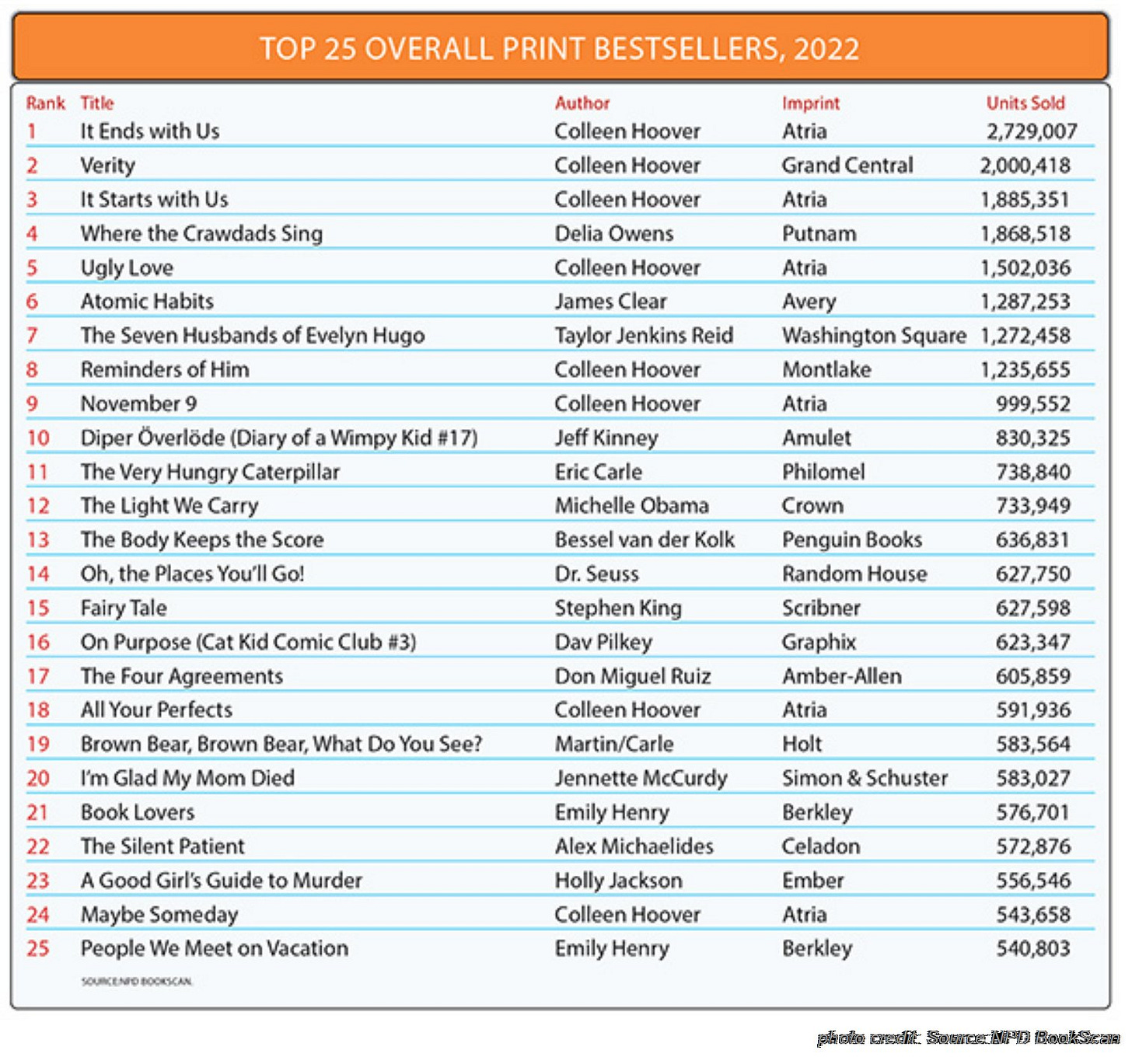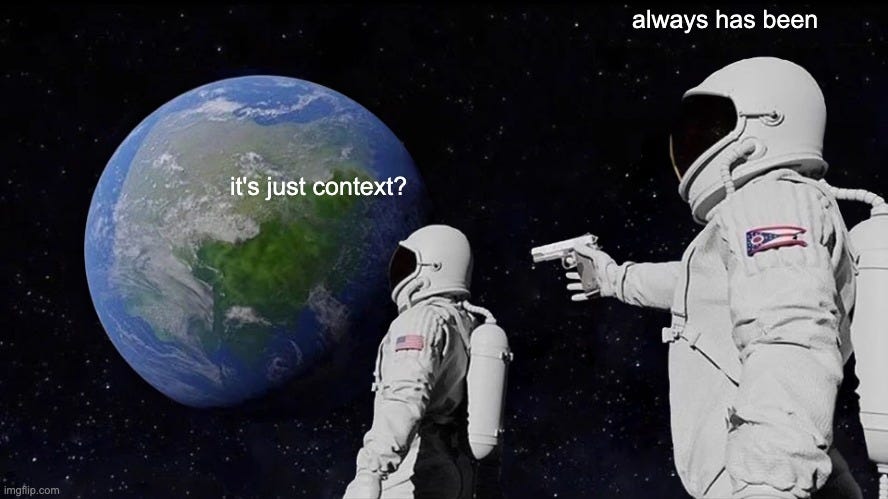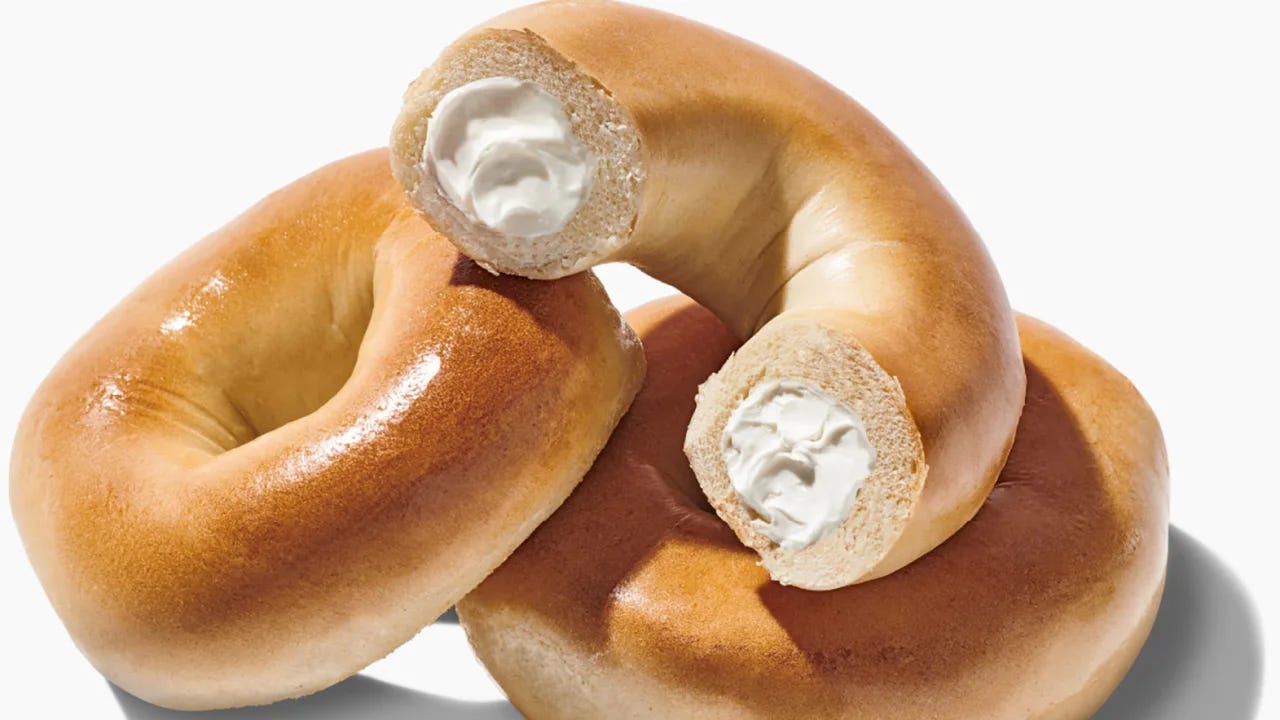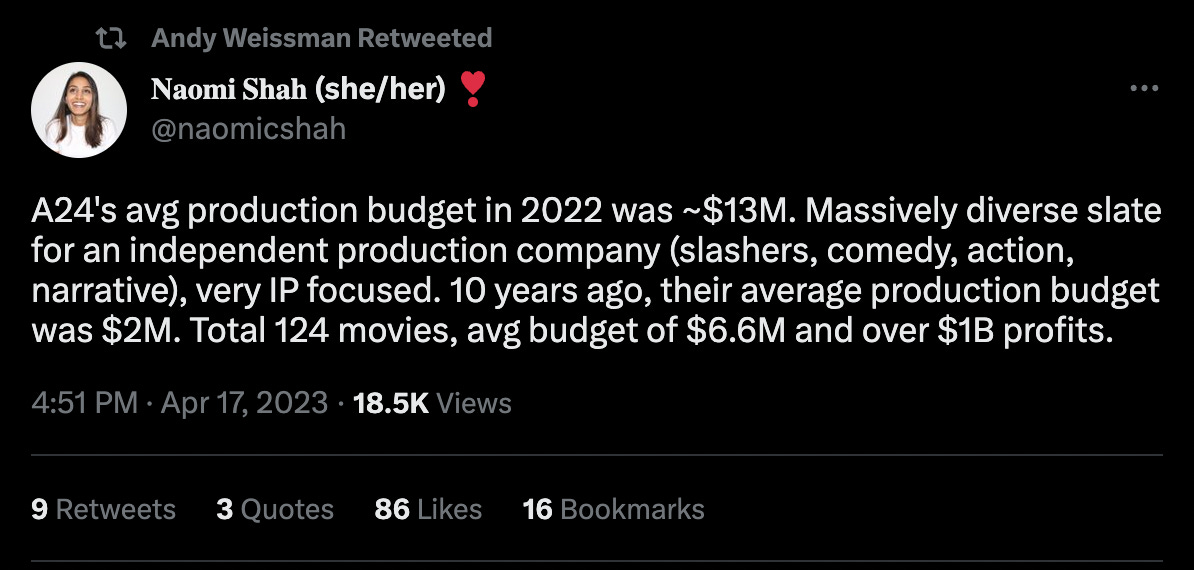Traditional Publishing vs Self-Publishing. It's Context Turtles All The Way Down
Also: Stuffed Tax Bagels, Prompt Injection, and a Kiss For the Whole World
For the modern writer, there’s always a discussion brewing on the merits of the publishing industry. Delilah Dawson has a great thread on what’s actually a dire outlook for a writer. Books can take 2 years to from booked to being sold by the publisher and then there’s no guarantee it would be a success. Sometimes, even longer.
I’m stuck in this conundrum: having self-published my first sci-fi novel, I’m considering going the trad pub route for a more contemporary novel I’m currently plotting. The biggest reason: wanting access to wider distribution and the still established perks/status that comes from having run this gamut and getting published. For some opportunities, it is still the case that you only get picked up or taken a look at as a writer if you’ve been trad published.
But, I’m not sure this is all it’s chalked up to be. And many writers feel the same. As Elle Griffin notes: most writers do NOT make anything worth a living from merely selling books. This image is for books sold online in 2020.
It is however, not an industry in decline, despite what it might feel like. Yes, people are competing with other media, but, fiction book sales are up year over year, and, particularly interestingly: print fiction is winning out over ebooks.
Stats for the US:
So, people *are* reading, probably, partly buffeted by the pandemic and new habits that formed from it. Barnes & Noble is also back, having pivoted their stores to act more like independent bookstores (and thus, not competing directly with the commodification of Amazon).
So, what gives? If the odds of a writer making a living from writing is dire, does it even matter whether you trad publishing of self publish?
As I mentioned before, we’re still in the era of the increasing power-law of media: the popular gets more popular, and the long-tail gets longer. More books out there than ever before, but the biggest authors make more money than ever before. Colleen Hoover sells millions of copies.
Thus, for most writers, you are actually playing a different kind of game. As Delilah said in her thread, you try to get lucky. As writers and readers, we all have been confused by why certain media is not as popular as it should be. Arriving at popularity does feel like luck. But, I think there might be more to it.
I honestly think that the most important factor that allows a story to get lucky is what the story can say about you (at a specific time). In other words: people collect stories to define who they are and then share it with others. It’s why people also buy books that they always ““plan to read””, but only end up taking up shelf-space in their living room. “I am that person who reads that book, and others who come here will see it too.” Putting it differently: the wishlist is who we say we are and who we want to be.
It’s also why, as Sachin, mentioned in his latest article, we sometimes consume the “aura” of a creator, they way they make us feel, rather than the actual creation itself.
I had a troubling realization about my artist and creator friends the other day - I rarely consume any of the art they create but, instead, voraciously consume their identity as an artist. Not that they are bad at what they do. Occasionally, I will read the odd short story or poem or watch a movie and marvel at their genius while being slightly envious. However, their identity as an artist, which they expertly perform, is inescapable and is part of my every day on social platforms.
You can’t automate authenticity, even in the era of ChatGPT and Stable Diffusion.
It’s thus why traditional publishing, even though it’s currently questionable in its ability to make authors a living, still establishes a sense of legitimacy for the story. A book that has more gravitas, status, and legitimacy has more weight to what it represents. Traditional publishing is thus, still, a multiplier.
It’s why persistence, as said by Counter Craft, can eventually bring success. Persistence builds legitimacy and it creates continuous context for the stories to find the people that might enjoy it.
Once that hurdle is crossed, it makes sense why the text itself isn’t actually the most important part. Merely selling the book is not fit anymore to make success as a writer, especially if you aren’t Colleen Hoover because the avenues for context creation is much wider than ever before. It’s not just a book in a bookstore anymore. The text has become more of a vessel on which all other experiences reside. People enjoy buying print books because of the tangible and meaningful way that other parts of the experience communicates who they are. It’s also why merchandise sales can sometimes trump sales of the actual media (notoriously the case in music or in sci-fi/fantasy franchises). In stories with successful merch avenues, the feeling is actually better encapsulated in this ancillary than the actual media.
It’s been interesting to see how writers use Kickstarter and Substack serialization to make more money than merely publishing their books. It’s not that serialization is a superior distribution format, it’s that you create continuous, connected context for the book: especially if you allow for things like author commentary and weekly discussions with readers. The story thrives when its given context.
So, ultimately, coming back to the question of traditional publishing vs self-publishing. A writer wants to ideally, both, make a living and have a widely distributed story that makes people feel something.
My current thinking is to think of traditional publishing, today, as one of the channels for legitimacy building through providing established and recognizable context. But, it’s not the only way. If you are smart about it, all stories can help us say something to ourselves and to others: the goal is to create that context to allow that to thrive. What that looks can differ widely. Rolling the dice in terms of publishing, to get lucky, should be focused on trying out different contexts for many stories. Do any of the following in various forms:
Publish a trad book.
Self-publish with Amazon and IngramSpark.
Do a kickstarter.
Do a serialization.
Go on BookTok and share what you enjoy!
Write a book that could have really fun T-shirt merch.
Maybe, it’s digital merch in the form of NFTs?
Make a cool trailer for it.
Try get that story optioned for TV.
Translations! Erik Hoel's novel is more of a hit in Italy (for example).
Maybe do an audio/podcast drama.
And on and on. :)
Context matters. It’s really just context turtles all the way down.
The Stuffed Tax Bagel
And now… for something completely different. BAGELS.
At first, one might imagine that this bagel and stuffed cream cheese is just another one of many attempts at food innovation. But, the bizarre part of the story, is why this innovation happened at all. This bagel is what happens when tax law meets American food innovation.
The obvious question, as is often the case with food mash-ups, is why. What’s so wrong with slicing a bagel and slathering on a healthy amount of cream cheese? Why must we pre-cheese the bagel? Because, Philly owner Kraft Heinz and H&H say, the simple acts of cutting and spreading are taxed, at least in New York.
Thus, to save on taxes, if it’s pre-made and not cut and spread, that tax is not charged. I found the relevant law, and it’s related to it being a prepared meal.
It looks yummy, although, I do like my bagels fresh and toasted. The side of tax I can deal with.
A24’s Budgets
I’m a big fan of A24’s films. As Naomi points out, I enjoy that their success came from making small/medium budget bets on new, interesting, IP. It shows that, despite the current crop of franchise IP, there is still demand for good, fresh stories that just need the boost from the right backers to get made (hint hint, someone please fund more seasons of Raised By Wolves).
Prompt Injection
In short, just simply using a prompt directly from another plugin can actually do something damaging: from deleting data to even actuating dangerous things. The rogue assistant example in the article can be quite damaging: if you don’t check, someone can email a dangerous prompt that’s read/processed by the LLM.
Real-time Painting with Stable Diffusion
I’ve been enjoying the use of AI tools to level up existing drawings. Mostly because, I often have a vision of a scene, but 1) drawing and doing it entirely yourself takes a lot of skill/effort/time, and 2) precisely prompting an AI scene is also hard.
Mixing the two helps when you can draw basic designs and then using AI like a filter to in-paint the “rest”. Definitely keen to play with this in the future. I’ve been meaning to get back into painting/drawing for years and this is a helpful and playful process to improve scene setting. This is great for story + moodboarding.
JPG Onchain Canon
My bread-and-butter: onchain NFTs. It really and truly utilises the blockchain as its own medium for art, not just linking to URLs elsewhere. JPG launched a new canon and I’m excited to see how many projects will get into it. Hopefully discover new projects along the way!
Get curating, friends!
Urbanism in North America Tier-List
This was a fun tier-list of North American urbanism by City Nerd. A city high on this list I haven’t been to yet that I’m planning to see this year, is Mexico City. Quite excited!
Two Songs!
Okay, first time I want to actually share two songs for this newsletter.
First off is Enter Shikari’s “A Kiss For The Whole World”.
Always been a huge fan of Enter Shikari and this new album delivers! A great electro-rock anthem! I enjoy the optimism of the album.
Be braced, be together
We'll be dancing on the frontline
To symphony number 9
Can you see us?
Nothing comes between us
The next is Vox Rea’s - Julia. Such a wonderful floating indie rock song.
Juliaaa, I’m a fool for ya!
Sing it. :)
Enjoy a sunset, friends! See you next week.
Simon













I self-published on KDP back in January. Selling has been rough, but I really wanted to the book in print for myself. I'm trying to manage expectations while making connections.
I loved this. Definitely how I've been thinking through publishing. It's a very interesting time to be a writer!